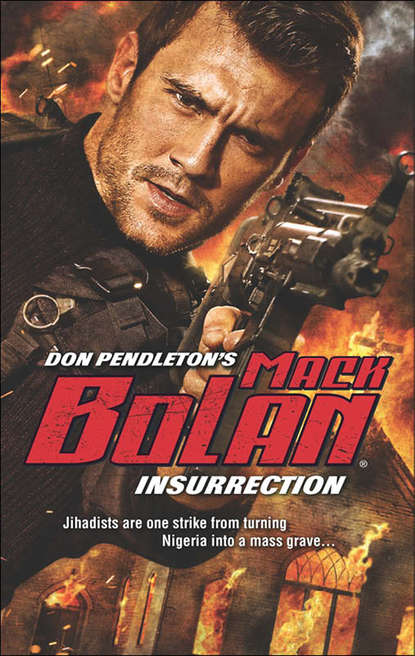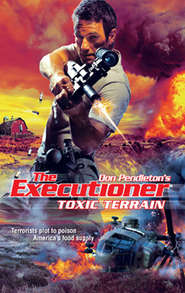По всем вопросам обращайтесь на: info@litportal.ru
(©) 2003-2025.
✖
Insurrection
Автор
Год написания книги
2019
Настройки чтения
Размер шрифта
Высота строк
Поля
“Up to a point,” Bolan replied. “I’m primarily here to find Bishop Joshua Adewale and get him safely back to the US. But I also plan to do all I can to rid your country of men like those who killed the parents of the orphans you have here. I just haven’t decided exactly how I’m going to accomplish that.”
The statement was meant to be blunt, and Galab took it that way, shrinking back slightly at Bolan’s words. “Let us make sure I understand you correctly,” she said in a small voice. “Do you intend to arrest or simply kill these men?”
Bolan paused a moment, looking deeply into the woman’s eyes. “I have no power of arrest in Nigeria,” he said. “But Boko Haram has gone way past that point. Even if I could arrest them, with all due respect, the Nigerian government has become so corrupt they’d probably be set free again.” He stopped speaking for a moment to let his words sink in. “So I intend to do what I have to do.”
The woman got the message. But instead of recoiling further, as Bolan would have expected, she seemed to relax. “I would like to help you, Matt, but I am neither trained as a fighter nor do I have the temperament to be one.” She paused and took in a deep breath. “I can, however, take you to men who can and will help you.”
“Can these men be trusted?” Bolan asked. “Both to be on our side and keep their mouths shut?”
“I believe so,” Galab said. “They are good men, I think. But they do not have a good leader.” She paused a moment, then added, “At least they haven’t had a good leader so far.”
Bolan uncrossed his legs and leaned forward slightly. While Galab seemed to be a caring person, he didn’t particularly trust her judgment on who could be counted on and who couldn’t. Many “good” people tended to think others thought, and behaved, as they did. And that was often not the case.
The soldier’s only option was to meet these men and decide for himself.
“Okay,” he said. “I’ll need a base of operations, too. Someplace I can store my gear and hide out when it becomes necessary.”
“Do you think it will become necessary?”
“At one point or another,” Bolan replied, “it always does.”
“Do you want to meet these men now?”
“There’s no time like the present,” he told her, standing. “Do you have a car?”
“I do.” Galab rose in turn. “Since I suspect I know what some of the things in your luggage are, I think we should take it with us.”
Bolan nodded. They left the building through a back door and found themselves in an alley. Two minutes later, they had loaded Bolan’s bags into the back of Galab’s Nissan Maxima.
The Isaac Center director was backing the vehicle out of her parking space behind the building when the first explosion of gunfire erupted.
A volley of rounds shattered the car window next to Bolan, missing both his and Galab’s heads by centimeters. Then more gunfire broke the side window next to the woman behind the wheel.
She screamed.
Another burst of bullets, this one coming from the front, turned the windshield into tiny fragments of glass. In his peripheral vision, Bolan saw a man wearing green fatigue pants appear to the side of the Maxima, pull the pin on a fragmentation grenade and roll the bomb under the vehicle.
“Hit it!” Bolan yelled. His left foot shot across the front seat and stomped down on Galab’s right, flooring the accelerator. She shrieked again, her voice blending in with the screech of the Maxima’s tires. They tore away from the grenade in reverse, peeling rubber like some teenage show-off leaving the local youth hangout.
Two seconds later, the grenade detonated, but they had cleared the kill zone and nothing but a few pieces of shrapnel hit the Maxima and skidded off.
Bolan had drawn the sound-suppressed Beretta, but not for the usual reason. He didn’t need to try to keep the 9 mm explosions from being heard by whoever was attacking them—in fact, the sound of return fire would actually have helped, telling their attackers that he didn’t plan to go down without a fight. But that aspect of the impromptu battle was overshadowed by the fact that Bolan didn’t want to burst his and Galab’s eardrums inside the Maxima. And if he counterfired with the massive Desert Eagle, there was every chance of that happening. Even with the windshield and side windows blown out, the .44 Magnum explosions inside the car would be deafening.
The Executioner dropped the front sight of the Beretta on the man who had thrown the grenade as the Maxima fishtailed farther away. Thumbing the selector switch to 3-round burst, he squeezed the trigger and sent two 9 mm rounds into the attacker’s chest. The third hollowpoint round rode high, grazing the top of the white turban on the man’s head.
Their attacker jerked with each shot, but kept running. And as he did, he pulled the pin on a second grenade. His final burst of energy ended abruptly. The grenade slipped from his fingers as he fell, dead before he hit the ground.
But the grenade was far from dead.
Galab had twisted the steering wheel, skidding the car in a half-circle. But then her mind seemed to stall and she froze in place. Bolan started to reach down and throw the transmission from Reverse into Drive, but before he could, the director seemed to come out of her trance and did it herself.
Bolan twisted in his seat, now seeing through the back window the man who had just fallen. His lifeless body lay on the concrete in the parking space they had just vacated. Next to him, the second fragmentation grenade still rolled and wobbled.
Then it came to a halt and prepared to explode.
Another man—by now the Executioner had seen enough to convince him that they were indeed Boko Haram terrorists—appeared dangerously close to the grenade. Bolan aimed the Beretta his way and sent another trio of rounds through the back window of the car to pound into his throat and head. This time the turban stayed on but turned red.
Bolan switched his attention back to the grenade in the parking space. It still lay where it had come to rest, and he was surprised that it had failed to explode. There had been more than ample time for it to detonate, since the pin had been pulled.
A dud. It happened. Particularly when weapons and munitions were purchased on the black market, the way terrorists usually obtained them.
But the Executioner had no more time or need to contemplate the stroke of luck. The workmen had all hit the concrete or found other cover. Bolan glanced toward the front of the Isaac Center and the dorms just beyond.
None of the bullets flying through the air, or the grenades, were heading that way.
“Get us out of here,” he ordered.
“But the children—” the center’s director started to say.
“Aren’t the target,” Bolan stated. “Weare. Now move it!”
She floored the accelerator, moving forward this time. The Maxima began to fishtail again, but the woman behind the wheel kept control and straightened it. They sped to the end of the alley, turned right and emerged onto a street. Suddenly they were cruising away from the attack, and the only danger left was the possibility of severing an artery on all the broken glass inside the Nissan.
“Praise God, Christ and the Holy Spirit,” Galab said around choking gasps for oxygen. Then, as the Maxima blended in with the other traffic, she drove on, skillfully weaving in and out of the flow until they reached the edge of the last market area the cabbie had driven through when he’d brought Bolan to the Isaac Center. The soldier thought back on their escape from the alley. At first the woman next to him had panicked, but then, suddenly, she’d settled down and reacted almost like a professional stock car driver. It was as if she’d become a different person.
“I thought you told me you weren’t a fighter,” Bolan said.
Galab glanced his way, her expression curious. “I did. I am not.”
“Well,” Bolan said, “once you got over your initial fear, you operated that steering wheel and foot feed like a lifelong hillbilly moonshiner trying to lose the Feds.”
The metaphor was obviously out of Galab’s frame of reference. “I do not understand,” she said, frowning.
“It just meant that you’ve got the skills of a well-practiced race car driver,” Bolan said.
“Ah, yes,” Galab said as she patted the steering wheel with both hands. “I have driven in rescue missions many times to get the children. I suppose I have picked up some skills along the way.” She paused, took in a deep breath, then let it out slowly. “But driving is not fighting. I do not think I could ever pull the trigger of a gun and take a human life.”
“You wouldn’t have to,” Bolan said, chuckling softly. “You could always just run them over in the street.”
The woman’s only answer was a smile. A moment later she turned into a parking lot, then settled the Maxima in an empty space. “It is better if we go from here on foot,” she said.
The soldier glanced around at the shattered windshield, shards of broken glass and bullet holes now decorating the vehicle. “Yeah,” he said. “I suppose we might draw a little unwanted attention in this thing.”
“And we should take your bags,” Galab stated. “Where we are going will be as good a place as you will find to store them until they are needed.”
Bolan nodded, got out and pulled the straps of several bags over his head to hang from his shoulders. “Aren’t I going to draw a lot of attention with all this?” he asked.
“Certainly,” the woman said. “But the path down which I will lead you will be away from interested eyes. At least for the most part.”











